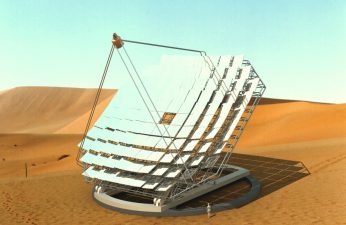 Sparked be energy shortage, and Egypt in so much turmoil, what will happen to solar energy projects like this one?
Sparked be energy shortage, and Egypt in so much turmoil, what will happen to solar energy projects like this one?
Many of us are following the recent turn of events in Egypt, in which the people have decided that it’s now time for some “changes” in the Land of the Nile. While the political ramifications of what will happen if Egypt’s long time leader Hosni Mubarak is forced to resign his post as Egypt’s President is still unknown, the question of continued environmental cooperation between Egypt and other countries is even more uncertain.
Egypt has been involved in a number of projects dealing with renewable energy, including solar energy projects such as a large scale solar thermal energy facility at Kuraymat, 100 km south of Cairo. That project should have been already producing 150 MW of electrical power which will help somewhat to provide the country with the electric power it needs for its growing population.
Egypt also intended to invest some of its $110 billion USD renewable energy budget in wind energy projects in the Gulf of Suez that were hoped to generate as much as 1,000 MW of wind generated electrical power.
Egypt is also a producer of natural gas; and export deals with countries like Israel have resulted in significant profits as well as tax exemptions from the countries it has sold the gas to.
Now, with the country in so much turmoil, many of these projects may be put on hold, and the gas contracts with neighboring Israel could even be canceled as a “cold peace” with that country could go into an indefinite deep freeze.
Egypt has been considered for years as a leader in many parts of the Arab World; not only from a political standpoint, but also in terms of regional economic cooperation. This economic cooperation however, has not always been received well at home, and as a result, protests occurred a few months ago when a shortage of power resulted in power cuts in many parts of Egypt.
This small energy crises “hiccup” should have served as a warning to Mr. Mubarak and his government that all was not well in his country, and that more effort needed to be made to bring about changes in a country where even professional people have to get by on low incomes.
The various social–economic problems besieging Egypt, including a severe housing shortage, high unemployment, and rising food costs have been the result of a severe “lack of planning” and an insensitivity from the government for the needs of a country with one of the fastest growing populations in the world.
Whatever Mr. Mubarak decides to do now to alleviate the demands of the people of Egypt, it may wind up being a case of “too little too late”, and the results of this could result in many problems, not only in this region, but further a field as well
Read More on Egyptian regional energy issues:
Israel and Egypt Considering Joint Solar Energy Project in the Sinai
Egyptian Energy Crises Sends Thousands of Protesters into the Streets
MIT Student Kindles Solar Manufacturing in Egypt



I don’t see it as a struggle for economic prosperity so much as a struggle for economic survival (on the ground). Democracy doesn’t work for every country, not in the true sense of the word, but ensuring that every one has access to food, power, and water can and should be achieved everywhere.
There are so many question marks hanging over the future of Egypt and its relationship with the Western world. What I see as a problem is the fact that the revolution in this country is more of a struggle for some kind of economic prosperity rather than democracy and this may have a number of unintended consequences in case this prosperity is not achieved in the future. Then the Egyptian people will find many reasons to accuse the Western countries of having promised something which is simply impossible to obtain.
Follow the developments and do let us know!
It will also be interesting to see what happens with the other Nile Basin countries? I wonder if they will capitalize on Egypt’s present vulnerability in order to usurp additional rights?